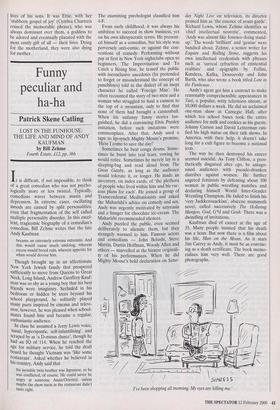Funny peculiar and ha-ha
Patrick Skene Catling
LOST IN THE FUNHOUSE: THE LIFE AND MIND OF ANDY KAUFMAN by Bill Zehme Fourth Estate, £12, pp. 366
t is difficult, if not impossible, to think of a great comedian who was not psycho- logically more or less twisted. Typically, comedians waver between mania and depression. In extreme cases, oscillating moods are caused by split personalities, even that fragmentation of the self called multiple personality disorder. In this excel- lent, tragicomic biography of a comedian's comedian, Bill Zehme writes that the late Andy Kaufman
became an extremely extreme extremist. And this would cause much undoing, wherein excess would breed ruin, wherein appetite for whim would devour him.
Though brought up in an affectionate New York Jewish family that prospered sufficiently to move from Queens to Great Neck, Long Island, Andrew Geoffrey Kauf- man was so shy as a young boy that his best friends were imaginary. Secluded in his bedroom or hidden by trees beyond his school playground, he solitarily played many parts inspired by cinema and televi- sion; however, he was pleased when school- mates found him and became a regular, enthusiastic audience.
In class he assumed a Jerry Lewis voice, nasal, hyperspastic, self-infantilising', and scraped by as 'a D-minus dunce', though he had an IQ of 114. When he reached the age for military service, he told the draft board he thought Vietnam was 'like some restaurant'. Asked whether he believed in his country, Andy said that
his invisible twin brother was Sapanese, so he was conflicted, of course. He could never be angry at someone Asian/Oriental, unless maybe the chow mein in the restaurant didn't taste right.
The examining psychologist classified him 4-F.
From early childhood, it was always his ambition to succeed in show business, yet on his own idiosyncratic terms. He present- ed himself as a comedian, but his style was perversely anti-comic, or against the con- ventions of comedy. Performing without pay at first in New York nightclubs open to beginners, The Improvisation and To Catch a Rising Star, he teased the public with inconclusive anecdotes (he pretended to forget or misunderstand the concept of punchlines) told in the dialect of an inept character he called 'Foreign Man'. He often recounted the story of two men and a woman who struggled to haul a cannon to the top of a mountain, only to find that none of them had brought a cannonball. When his unfunny funny stories lan- guished, he did a convincing Elvis Presley imitation, before such imitations were commonplace. After that, Andy used a tape to lip-synch Mighty Mouse's promise, `Here I come to save the day!'
Sometimes he beat conga drums. Some- times he burst into real tears, vowing he would retire. Sometimes he merely lay in a sleeping-bag and read aloud from The Great Gatsby, as long as the audience would tolerate it, or longer. He made an inventory, on index cards, of 'the plethora of people who lived within him and his var- ious plans for each'. He joined a group of Transcendental Meditationists and asked the Maharishi's advice on comedy and sex. Andy was urgently motivated by satyriasis and a hunger for chocolate ice-cream. The Maharishi recommended silences.
Andy puzzled the public, even seemed deliberately to alienate them, but they strangely warmed to him. Famous actors and comedians — John Belushi, Steve Martin, Dustin Hoffman, Woody Allen and others — marvelled at the bizarre originali- ty of his performances. When he did Mighty Mouse's bold declaration on Satur- day Night Live on television, its director praised him as 'the essence of avant-garde'. Richard Lewis, whom Zehme identifies as `chief intellectual neurotic', commented, `Andy was almost like Ionesco doing stand- up.' The words 'brilliant' and 'genius' were bandied about. Zehme, a senior writer for Esquire and Rolling Stone, suggests his own intellectual credentials with phrases such as `surreal refraction of existential realities' and epigraphs by Fellini, Kundera, Kafka, Dostoevsky and John Barth, who also wrote a book titled Lost in the Funhouse.
Andy's agent got him a contract to make reasonably comprehensible appearances in Taxi, a popular, witty television sitcom, at 10,000 dollars a week. He did an acclaimed one-man show at Carnegie Hall, after which ten school buses took the entire audience for milk and cookies as his guests. Johnny 'Carson and David Letterman rati- fied his high status on their talk shows. In America, with their help, it doesn't take long for a cult figure to become a national icon.
The way he then destroyed his career seemed suicidal. As Tony Clifton, a pros- thetically disguised alter ego, he antago- nised audiences with pseudo-drunken diatribes against women. He further angered feminists by defeating about 300 women in public wrestling matches and declaring himself World Inter-Gender Wrestling Champion. He failed to finish his `very Jackkerouackian', obscene mammoth novel, called successively The Hollering Mangoo, God, G*d and Gosh. There was a dwindling of invitations.
Kaufman died of cancer at the age of 35. Many people insisted that his death was a hoax. But now there is a film about his life, Man on the Moon. As it stars Jim Carrey as Andy, it must be as convinc- ing as a death certificate. The book memo- rialises him very well. There are good photographs.
`I've been shopping all morning. My eyes are killing me.'


































































 Previous page
Previous page